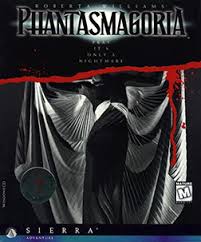phantasmagoria
英 [,fæntæzmə'gɔːrɪə; -'gɒrɪə]
美 [,fæntæzmə'ɡɔrɪə]
phantasmagoria 幻灯,幻觉效应来自希腊语phantasma,影象,幻象,agora,集会,广场。比喻用法,用于指早期的舞台表演的幻灯,引申词义义幻觉效应。
- phantasmagoria (n.)
- 1802, name of a "magic lantern" exhibition brought to London in 1802 by Parisian showman Paul de Philipstal, the name an alteration of French phantasmagorie, said to have been coined 1801 by French dramatist Louis-Sébastien Mercier as though to mean "crowd of phantoms," from Greek phantasma "image, phantom, apparition" (see phantasm) + second element probably a French form of Greek agora "assembly" (but this may have been chosen more for the dramatic sound than any literal sense). Transferred meaning "shifting scene of many elements" is attested from 1822. Related: Phantasmagorical.
- 1. Phantasmagoria portray the unspeakable, they rise above the written language.
- 幻影描绘无法形容的事物, 它超越了语言文字.
来自互联网
- 2. The phantasmagoria of his brain vanished at sight of her.
- 一见到她他脑海里的种种幻影便全没有了.
来自互联网
- 3. Why, to put such a phantasmagoria on the table would be defiling the whole flat.
- 是啊, 在桌上摆这么一个妖形怪状的东西,就把整个住宅都弄得乌烟瘴气了! ”
来自互联网
[ phantasmagoria 造句 ]
